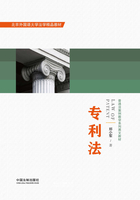
C.Justification of Patent System
The patent is a powerful tool.It does not give you any reward; it does not give your any money; it does not,contrary to the most widely held primitive misconception,even give you any right to do or make,or sell anything.Indeed,the right to practice your own invention does not come from the patent,as the nature of things directs that you do not need any permission from anyone to practice your own ideas – in most cases – and if anything,the practice of your own invention may be regulated by other laws,not by patent law.You may invent a new weapon,and you may even be able to get a patent for it,but whether you can piece it together and use it,despite the patent you have,depends on other laws such defense law,or public security law,not the patent law.In fact,most likely that you will end up in jail if you do make and sell such a weapon.So what on earth does this powerful tool give you?
It is the right to exclude others,to stop them,from exploiting and benefiting from your invention.What kind of power is this thing called a“patent”?
Imagine in a primitive world where there was no patent law: you make a chair for the first time; everyone else would imitate your invention.Can you stop them? No,because,“imitation is the mother of invention.”You invent based on other people’s ideas,and others make more inventions based on your invention.The entire human civilization is built upon“learning”by imitating others.Nay,even animals learn by imitating.We imitate and add our own experience to make up our knowledge,the sum of which makes our life,and ourselves,better and better.Since when,then,can you stop others from imitating your work product? And what kind of power is it that can regulate other people’s behavior?
First of all,it all started with government.Whenever a society is formed,there were some primitive rules that all members of that society had to follow.Even a lion has to find its place in the pride,or a wolf in the pack.It is the patriarch with authority consented by the members in the pride or pack that has to enforce these rules.The same thing with people.We learn from our parents by imitating in the first place,and from others as we grow up.This is nature’s rule.But at what point does it become unacceptable in society to imitate others to do whatever you want?
Take the lions’ pride for example.The newborn cubs struggle to get milk.That’s sheer competition by strength,a natural state of things.As they grow bigger,they watch their mother to kill and struggle with each other to get their share on the mother’s kills.But quickly enough,when the patriarch lion comes,they learn to back off,or they could be killed.At that point,competition is no longer a chaos; it has to have rules.It’s not voluntary or natural rules,and these rules have to be enforced by authorities.
As we march on from primitive times,we also develop rules for ourselves.Competition,as we know it,once absolutely free and unregulated,became so fierce that we need to regulate it,or it would produce chaos,good for nobody.Imitation,still the basic practice for human behavior,needs to be regulated in terms of highly sophisticated commercial societies or bad competition would occur,producing undesirable results from which no one would benefit.With the previous chair example,when our first inventor made it,he would need to have some protection for his invention,or,if anyone is free to reap from work,he would have no incentive to make further inventions,or at least,he would not let other to benefit from his invention anymore.